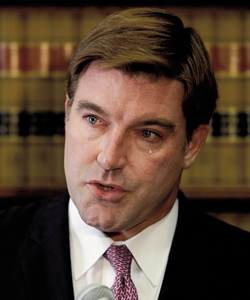When Kentucky attorney general Jack Conway ’91 stepped behind the podium last March to announce he would no longer defend the state’s same-sex marriage ban, he was, in effect, walking onto the national stage. He was not the first attorney general to take such a stance—there had been seven before him, and more since—but his five-minute, heartfelt remarks went viral, and the moment became another turning point in the marriage-equality movement.
“I came to the inescapable conclusion that if I [defended the ban] I would be defending discrimination,” Conway said during the press conference. “That I will not do. As attorney general of Kentucky, I must draw the line when it comes to discrimination. The United States Constitution is designed to protect everyone’s rights, both the majority and minority groups.”
What caught the attention of hundreds of thousands of online viewers was the catch in Conway’s voice when he discussed the role his wife played in his decision. “I got to the part about the counsel of my wife, Elizabeth, and lost it,” says Conway, adding that the emotional experience was a first in his two terms as attorney general. “Knowing what we’d been through together and what we’d been through in this decision, I realized what she did for me was an act of love and partnership, no more or less dignified than anyone else in a loving relationship.”
Elizabeth Conway had encouraged her husband to stay true to his principles. In the days following U.S. District Judge John G. Heyburn’s ruling, which stated that Kentucky must recognize gay marriages performed in other states and countries, Elizabeth pulled him aside and said, “Jack, you stink when you aren’t authentic,” recalls Conway. She was right, he says, and it crystallized his thinking. “It wasn’t a hard decision in my heart, but it was hard to execute.”
While Conway’s chief deputy, Sean riley, a 1999 Trinity graduate, and other close staffers supported his decision, some political advisers warned that taking such a position in a conservative state could hurt his political career. Also, he would have to inform his client, fellow Democrat and Kentucky governor Steve Beshear, that he would no long represent the state in the case. “I respect Governor Beshear very much,” says Conway, “but I decided fighting against inequality is bigger than anyone’s political career.”
Beshear announced the state would hire outside counsel to appeal Heyburn’s ruling. Meanwhile, Conway says, he hasn’t lost a moment’s sleep over his decision, and in May he announced his plan to run for governor in 2015.
The warnings from some political advisers may prove to be an outdated political calculation. “Voters under the age of forty-five think of being gay like being left-handed,” Conway says. And if the letters to his office —80 percent in favor, 20 percent opposed— are any indication, there is broad support for marriage equality, even in a red state.
“I’m hearing from families saying thank you for standing up for us, but I’m hearing from a lot of CEOs, too,” he says. “One—a strong republican—mentioned that his company has a diversity policy for same-sex partners that’s important for recruitment. University presidents have made the same case. It’s difficult to recruit top talent if you’re asking them to come into an environment more hostile than the one they’re leaving.”
Conway learned first-hand the powerful influence of diversity as a Duke freshman. “I came straight from twelve years of Catholic school in Kentucky—I thought I knew more than I did—and I was paired up with a kid from New York City,” he laughs. “Hearing different points of view and having people challenge what I thought was extremely important.” He still recalls the heady experience of reading Bearing the Cross: Martin Luther King Jr. and the Southern Leadership Conference by David Garrow. Class discussions on ethics and decision-making focused on “the difficulty of doing what you think is right,” he says, “when you’re faced with passions that may conflict.”

Share your comments
Have an account?
Sign in to commentNo Account?
Email the editor